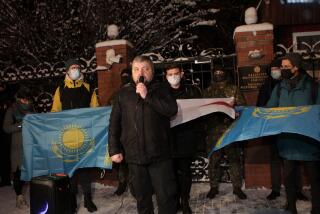Arrest of Bujak Will Paralyze Solidarity, Polish Official Says
- Share via
WARSAW — A senior Polish security officer boasted Monday that the arrest of underground Solidarity leader Zbigniew Bujak three days ago after a four-year manhunt could be expected to paralyze the outlawed labor movement across the country.
But Lech Walesa, who won the Nobel Peace Prize in 1983 for his leadership of the movement during its 16 months of legal existence, said in response that no attempt to “scare or blackmail us” will deter the nation from pursuing the democratic ideals that Solidarity represents.
“We will continue,” Walesa said in a statement issued in Gdansk. “A man such as Bujak had more democratically cast votes than any organized (state) group . . . existing in Poland today.”
The 31-year-old Bujak was the most prominent surviving member of the Solidarity underground, which came into existence as the 10-million-member movement was suppressed under martial law in December of 1981.
National Symbol
As a founding member of the underground’s Temporary Coordinating Committee, Bujak became a national symbol of defiance to the Communist authorities, issuing bold but increasingly ineffective calls for strikes and peaceful demonstrations in an effort to assert the deep moral authority that Solidarity still commands.
His arrest was a heavy psychological blow to the active opposition and its millions of supporters.
“This really seems like the end--of something, I’m not sure what,” a woman in Warsaw said, expressing a feeling of despondency that many share.
In practical terms, Bujak’s arrest may mean relatively little. Apart from loosely connected groups producing a huge volume of underground literature, Solidarity as an organization--as opposed to an ideal--has grown increasingly moribund over the past two years, as confrontation with the authorities seemed ever more futile.
Qualified Activists
“If you ask who supports Solidarity, you’ll find almost everyone does to one degree or another,” a diplomat observed. “But if you ask who wants to join a strike or a demonstration, you won’t get many takers these days.”
Solidarity’s day-to-day activities, the most visible of which is the underground press, are conducted by widely dispersed, largely autonomous groups that do not depend on a central leadership.
“The loss of Zbyszek (Bujak’s nickname) is a great loss, because he is the activist who animated the movement for nearly five years,” Zbigniew Romaszewski, a prominent Warsaw activist, told the Associated Press. “As far as the movement itself is concerned, I am of the opinion that it is so broad, so independent from central structures, that I don’t expect any significant changes.”
Making Political Hay
Western analysts and many Polish observers expect the government of President Wojciech Jaruzelski to seek to extract as much political gain as it can from the arrest. They expect the government to use it as a springboard for a propaganda campaign with at least three objectives--nurturing a sense of defeat among Solidarity supporters, seeking to discredit the opposition by linking Bujak to Western intelligence and encouraging the impatient Soviets to believe that the arrest has broken the back of the organized opposition.
A senior security official, Gen. Henryk Dankowski, appeared to have launched the expected campaign Monday with an article in the main Communist Party newspaper Trybuna Ludu. Dankowski, the deputy chief of the security police, described Bujak as a man who “led the entire clandestine activity of the so-called underground,” and who, “on a national scale, inspired illegal printing activity, strikes, work stoppages, street riots and other excesses.”
Bujak’s arrest, Dankowski predicted, “should paralyze the activity of illegal structures both in Warsaw and throughout Poland.”
Western Influences
In keeping with a standard line that the opposition has little domestic support and lives instead on clandestine foreign help, Dankowski said Bujak’s activities were “controlled and inspired by Western special services and centers of ideological subversion.”
“We have seized interesting and significant documents pertaining to the underground,” the security officer said. He added that “high-tech communications equipment and Western currencies were also found.”
More to Read
Sign up for Essential California
The most important California stories and recommendations in your inbox every morning.
You may occasionally receive promotional content from the Los Angeles Times.













